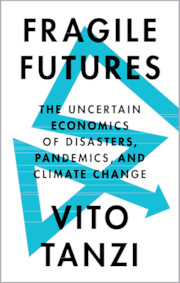Book contents
- Fragile Futures
- Fragile Futures
- Copyright page
- Contents
- Acknowledgments
- Epigraph
- Part I Uncertain Future Events and Reactions to Them
- Part II Pandemics and Other Disasters
- Part III Climate Change and Global Warming
- 11 When the Earth Became Man’s Private Property
- 12 Early Concerns about the Environment
- 13 From Environmental Concerns to Climate Change
- 14 From Climate Change to Global Warming
- Part IV Back to Some Theoretical Issues
- References
- Index
12 - Early Concerns about the Environment
from Part III - Climate Change and Global Warming
Published online by Cambridge University Press: 28 April 2022
- Fragile Futures
- Fragile Futures
- Copyright page
- Contents
- Acknowledgments
- Epigraph
- Part I Uncertain Future Events and Reactions to Them
- Part II Pandemics and Other Disasters
- Part III Climate Change and Global Warming
- 11 When the Earth Became Man’s Private Property
- 12 Early Concerns about the Environment
- 13 From Environmental Concerns to Climate Change
- 14 From Climate Change to Global Warming
- Part IV Back to Some Theoretical Issues
- References
- Index
Summary
Description: Historically, there had been a tendency to see random bad events, such as disasters, as “Acts of God.” These included pandemics and climate changes. The Industrial Revolution created great and growing demand for energy that was increasingly provided by “dirty” fossil fuels. It also created a strong faith in “progress.” Population growth and rising incomes contributed to the demand for more energy. The use of fossil fuels (coal, oil, gas, etc.) progressively increased the amount of greenhouse gases in the atmosphere. <break>In recent decades, these gases have increased at a faster pace than in the past, leading, so far, to an increase in the average world temperature by more than 1 degree Celsius. <break>The effects of this temperature change have become increasingly noticeable. The temperature is expected to increase further in future years. The increase could reach or exceed 2 degrees, which could have potentially catastrophic effects. Under present trends, such an increase seems likely by the year 2100. <break>The medium-run effects of the temperature rise would diverge among nations, with some (especially Russia and Canada) gaining and many losing. Under current trends, it would be very difficult to stop this process, in spite of ongoing attempts to slow it down. The most recent years have been the warmest on record. There are other worrisome environmental trends that require attention and solutions (e.g., excessive use of plastic, fertilizers, and damaging chemicals).
Keywords
- Type
- Chapter
- Information
- Fragile FuturesThe Uncertain Economics of Disasters, Pandemics, and Climate Change, pp. 141 - 165Publisher: Cambridge University PressPrint publication year: 2022

